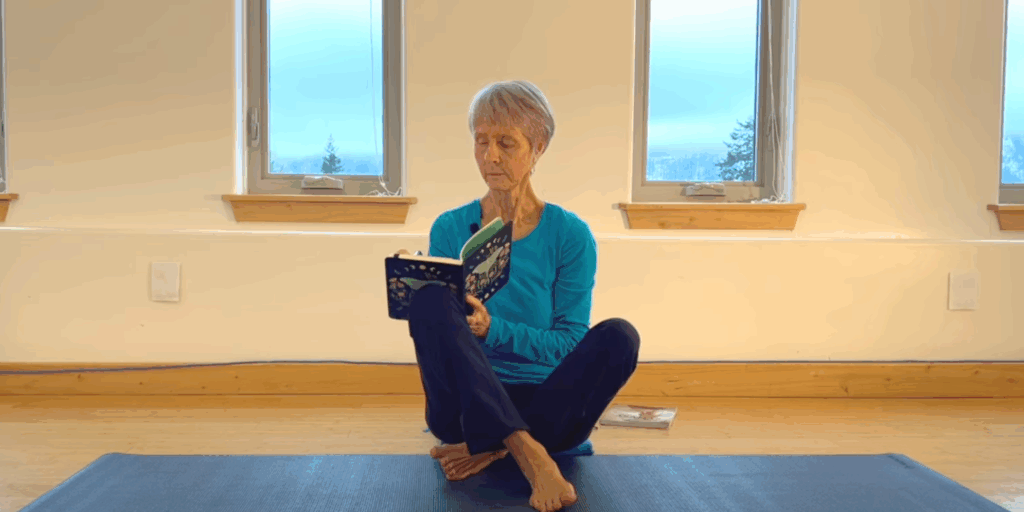
Years ago I was involved in teaching equestrian riding to a variety of children and young adults. It was a gift to watch them develop skills, and take on the partnership of working with a pony or horse much larger than they. Gradually, through consistent, respectful practice, students gained a sense of personal empowerment as they began to take charge of their equine partner. That confidence was evident in their daily lives, reflecting personal values that helped them make meaningful choices.
When I became involved in yoga, I recognized that it too was a multifaceted learning experience which was personally empowering. Taking that first step with Hatha Yoga, I found myself gradually getting in touch with my body in a much deeper way. Daily practice involved moving through gentle asanas slowly, which required a consistently patient, receptive approach. This parallelled the way the students had worked with their ponies, through consistent repetition and vigilant observations.
Swami Radha’s Hidden Language method involves self-inquiry: There are reflection questions which require us to pay closer attention, become aware of the breath, asking, was it holding or flowing with an even rhythm?
Engaging in a step by step guided relaxation invites reining in the mind and asking it to focus on the length of the inhalation, length of the exhalation. This brings with it awareness and an increasing sense of calm and deepening relaxation throughout the practice. Exhalations done with awareness invites areas that are holding or showing signs of tension to release, soften and from that an opening receptivity is created. Tuning into my breath and body in a deeper, more conscious way allowed inner wisdom to bubble up and reveal itself.
Checking Into the Body’s Wisdom
Standing still in Tadasana, Mountain pose, I ask : Where am I physically? Is my mind present, or off planning the day? Where am I emotionally, what’s happening? These are questions that can be asked at any time, checking in rather than “checking out”.
Yoga is now, providing a pathway of self-inquiry and gradually leading to liberation from limitations. Personally, I found myself surprised at the wisdom within that was revealed as I became more aware of what was going on with my body and the thoughts that were running through my mind. Gathering the insights, I captured in my journal reflections as they came forward. Here was a new way to deepen self-understanding.
It was as though my body’s wisdom was training me – move slower, be more patient, gentle and perhaps pay special attention to areas that needed adaptations due to previous injuries. Directing my mind to pay closer attention while letting go of expectations, dropping any kind of competition, I began acknowledging my body as a valuable spiritual tool.
“In yoga, self-inquiry is a trusty tool and the basis for action. If we start to get a sense of our purpose, then we can engage our will and put in the effort needed to move forward. Practice is essential. We can see that in whatever we do – whether we write, create art, clean, build houses, do business, practice medicine. We learn through practice.” – Swami Lalitananda
The practice of Hidden Language and reflection encouraged me to observe my mind more often throughout the day and become aware of what I was thinking in the moment. A spot check so to speak – how am I feeling, what am I thinking? I recognized the power of these thoughts when I simply went along with them as a passenger and identified with them. When negative thinking cropped up, there was a choice: Was I going to identify with it, go along for the ride or stop and take a stand?
By exercising my will I had the opportunity to invite in a powerful ally – the repetition of Mantra. Positive vibrations in the form of the Om Tara mantra, a call to Tara the Goddess of compassion, asking for Her assistance in guiding and lifting the mental chatter. Mantra practice was an invitation to elevate my inner speech. Once again, self-inquiry helped bring about change by asking: What kind of person do you want to be?
Taking action required making the choice to remove the present obstacle of negativity, lift my thoughts and speech through the power of mantra and move consciously towards my higher purpose in life.
“Thoughts have wings, where do you want to fly?” – Swami Radha
Practice
Inner Roar and Empowerment: Simhasan
1. I invite you to practice the Lion pose, Simhasana, offered in the Hidden Language format.
2. To begin, give yourself 20-30 minutes of warmups – cat stretches, downward facing dog, standing shoulder rolls, gentle neck movements, slowly move through sun salutations.
3. Sitting, add some face warm ups opening your jaw wide, eyes open looking upward then sticking out your tongue towards your chin while exhaling audibly from deep in your belly – there: Lion’s breath!
4. Choose a sitting position that’s right for you – kneeling or sitting cross-legged (changing the way your legs are crossed for the 2nd time) or sitting in Padmasana.
5. Pounce forward – bringing the weight forward placing the palms on the knees and spread the fingers or
6. Bring the whole body forward placing your palms on the floor to support yourself. Firm the buttocks tuck the tailbone and open the chest.
7. As you move from sitting to springing forward, open your jaw, stretch your tongue out towards your chin, lift your eyes up and exhale fully.
8. Return to your seated position and rest.
Reflection From Inner Life of Asanas
Swami Sivananda advises yogis: “Roar like a lion. Don’t bleat like a lamb.”
Choose either the lion’s breath, chanting Om or roaring like a lion as you move in and out of the pose, observing, seeing, feeling the physical, mental, emotional and spiritual aspects of the pose. Ask yourself:
- Where does pride limit my choices?
- Reflect on the relationship between anger and fear. Where can you be courageous and leap forward wholeheartedly?
By Durga
